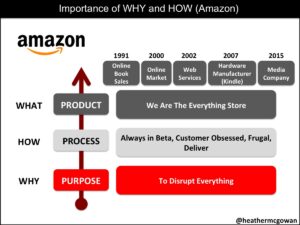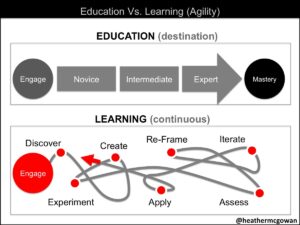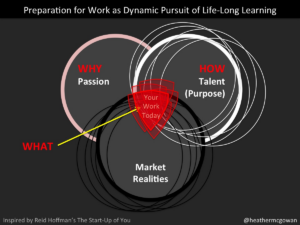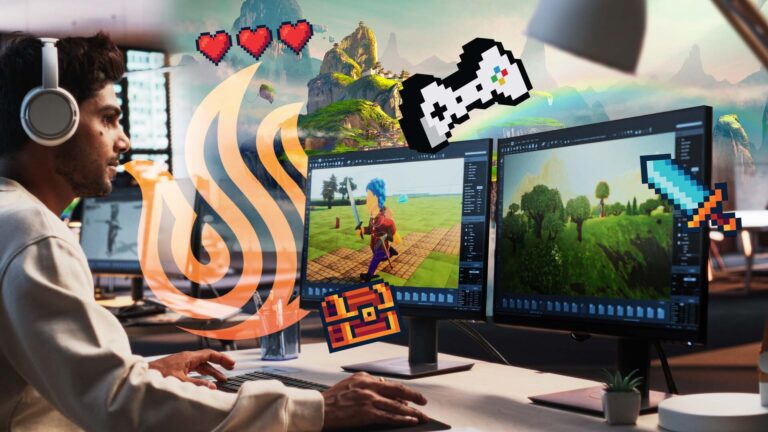This article was previously published on linkedin.com by Heather McGowan and Chris Shipley. This is Part 2. See Part 1 here. Main image courtesy of the USV Collective.
As technology- and social-driven change accelerates, products, services, and even companies are turning over ever more quickly to be replaced by a better solution, a new business model, or an entirely new paradigm. Look no further than Amazon, in its relatively brief 23 years, the company has morphed through many identities: online bookseller, platform marketplace, web services hosting and storage, hardware manufacturer, entertainment media company. It’s even won Academy Awards. Not bad for a “bookstore”. If Amazon had decided it wanted to be the best online bookseller in the world when it was a startup in 1994, it might be frozen as only that today —if it had survived the dot.com bomb at all.

Moving Beyond Expertise
Like Amazon, we need to become much more adaptable in our self-definition, focusing on WHY we work, and not simply WHAT we do. To make this leap, we need to shift our thinking from creating a deployable workforce of experts to developing a citizenry of life-long learners. We need to move from “education”, which connotes the end state of being “educated”, to learning, a continuous process of discovery, enlightenment, and new skills development. We need to get very comfortable being “newbies” embracing the opportunities of emerging ideas.

How do we get there? Like Sinek suggested consulting companies on their communications, we believe we must start with WHY. We must find in ourselves, and encourage in others, our core and principled passion, a concept that needs to be reclaimed from what many see as the domain of the elite, a privilege to be pursued only by those who have somehow earned the luxury to pursue it. Creativity and purpose will be key drivers as we enter the augmented era.
Passion, writ large, is the catalyst for inquiry that fuels lifelong learning. With passion at the center, raw talent and innate drive will direct that curiosity towards activities that are purposeful and productive. To be clear, though, passion isn’t some utopian pursuit. Passion and purpose must be weighed against market realities to identify and apply that passion to create value.
Just like Amazon shifted its WHAT around a core and principled WHY so too will individuals engage in shifting market activities as the application of their core passion. In other words, one’s passion stays largely fixed while the market realities shift causing the individual to add new skills to expand their talent applications to meet shifting market demands.

This new formula suggests new sets of questions to steer an individual, regardless of age, away from a set work identity toward an identity centered on motivational passion bolstered by a fluid and agile learning mindset best equipped to meet the flood of opportunity in the future of work.
We are not alone in our thinking. Jonas Prising, CEO of the $20 billion human resource consulting firm Manpower Group, told the Economist (Life-long Learning Is Becoming an Economic Imperative), “Organizations have moved from creating talent to consuming work.” In a 2016 survey conducted by his company, Prising notes that 93% young workers profess a willingness to pursue new learning – and plan to spend their own money to do so. At the same time, companies are placing a strong emphasis on learning as a skill.
The implications of this shift are tremendous. Much, if not all, work will be done outside the familiar containers of jobs. A college degree is no longer a ticket to middle-class employment. Instead, a degree is, at best, a starting point. It is the learning foundation that enables life-long students to identify new opportunities to pursue their passions. In this way, they stay steps ahead of the machines that learn and replace human skills too quickly for our old model of codified and transferred learning to keep pace.
More concerning, this shift is affecting our global society. This loss of work-centered identity has caused a profound crisis. If I am not an accountant, union ironworker, or marketing executive, what am I? In a hyper-connected, global society where work has become unbundled from jobs and outsourced to automation or lower cost providers, many workers long for a simpler time of plentiful, stable, and predictable jobs. That yearning has given way to a populist movement that is changing the face of world politics, an issue New York Times columnist Thomas Friedman recently explored in his column, Owning Your Own Future.
Now, as we abandon the linear path from learning a skill in order to work and turn down the road on which we continuously learn, we must adopt a new set of questions to get to passion and purpose rather than the application of skills and knowledge.
What interests you? We will ask children.
What are you exploring? We will ask college students.
What drives you? We will ask our colleagues.
Afterword
We must move beyond our current systems of education to build fluid and openly available opportunities for life-long learning. If more of us need not only higher levels but also ongoing access to education and learning, it is a societal and economic imperative that we afford that access and build support to expand attainment.
Work to Learn, the mantra of these authors, speaks to the changing requirements of a future workforce and is the framework for their writing, speaking, and consulting.
Heather McGowan and Chris Shipley write, speak, and consult with education, corporate, and government clients on the future of work. They are currently writing a book on the topic. You can learn more about their work at Work to Learn. Heather’s LinkedIn network is open. She welcomes conversations about the future of work, future of learning, or creating learning networks. Contact heather@heathermcgowan.net for speaking engagements or consulting requests for either Chris or Heather.


